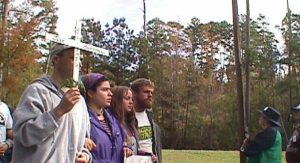CROSSING THE LINE
by Nick Fracaro

One of the reasons I’ve lived with theater for so long is that I’ve found myself involved over and over with people such as Erik Ehn. There is a perpetual aloneness about him even as his wit and enthusiasm extend life to whatever gathering with which he’s involved. It’s as if at any moment he could disappear from the gathering; leaving nothing but his memory. His words would compete with this memory of him. But even as his plays attempt to haunt and hunt, they are pale shadow to the playwright himself. His presence in the ensemble always has more weight than his words.
Theater is about presence first, everything else second. We would pronounce presence much like we would pronounce “presents”. Our gifts our acts our words our theater are the metaphysics of our presence, which belong to two worlds at once. Memory is the Great Seducer always pulling us from the present reality toward the larger gathering. How insignificant our collection of acts and experiences, our “body of work,” appears when set in relief against History. But this body of work is the only gift we have.
Erik was one of the 2,000 some protesters who “crossed the line” at the SOA demonstration. He was part of a four-by-four procession that did a solemn funeral march onto Ft. Benning property toward promised arrest. The prior ceremony that weekend had been a rehearsal for this moment of action. Rehearsal from rehercier (French, to harrow again) Originally “to harrow” meant to descend to the underworld in order to bring back the souls that reside there. Each marcher carried a white cross with the name of one who was murdered in Latin America as result of soldiers trained at the School of the Americas. On stage with the microphone someone read off the names and ages of these victims followed by the communal response: ! Presente ! One by one the names. Step by step the march. Over and over the word ! Presente ! as if the marchers and witnesses could somehow will the memory of those absent into flesh again. The gathering belonged to more than one world.
The promised arrest never happened. The authorities weren’t prepared to handle the magnitude of the action. Too many had “crossed the line.”
Shakespeare was one of the King’s Players before he was a playwright. One role he would play often was that of the Ghost of Hamlet’s father. The opening lines of Hamlet are:
Who’s there?
Nay, answer me. Stand and unfold yourself.
Is Erik the actor or the playwright on those days when we say goodbye and separate from whatever gathering? Is he the Ghost of my father or the Flesh of my son? Words, the Speaker or Deeds, the Doer. Which one of us first turned and started to walk into memory? Theater is the promise that “I’ll see you on the other side.”
! Presente